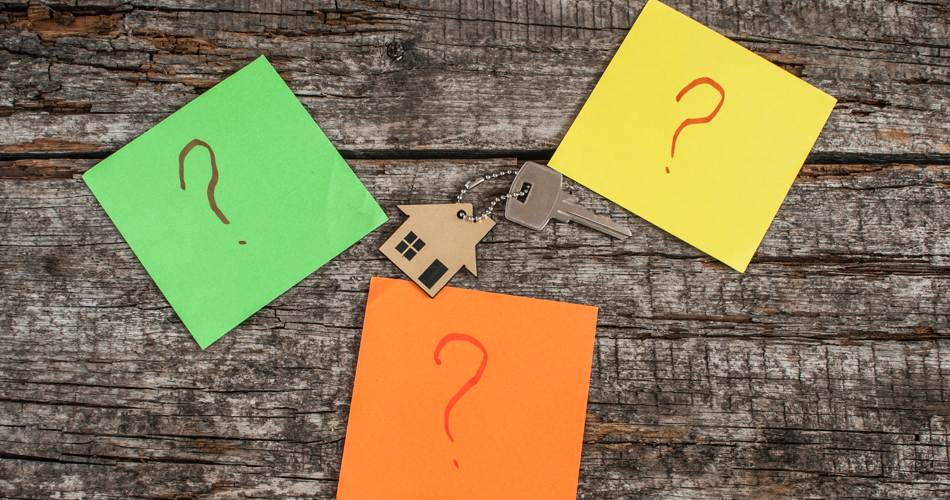Before you start dreaming of marble countertops and feature walls, it’s important to know what you’re getting into with your mortgage. This means you should be asking some key mortgage questions before you start house shopping.
It can seem like a complicated process but it doesn’t have to be as long as you know what to expect. Knowing this information now will help you understand how much you need to save, what you can afford, and how you can save money over the term of your mortgage.
Here are seven of the most common mortgage questions that come up for home buyers when they look at their mortgage options.
- What’s a good down payment?
- Can I use gifted money towards the down payment?
- What is mortgage insurance and do I need it?
- What’s the difference between fixed and variable rates?
- How does my credit score affect getting a mortgage?
- Will my tax credits interfere with my mortgage?
- How can I save money on my mortgage?
1. WHAT’S A GOOD DOWN PAYMENT?
If you can save up at least 20 percent of a home’s purchase price, you’ll avoid needing to pay mortgage insurance (which we’ll talk about next). This is the recommended amount because you’ll likely have more financing options and slightly lower interest rates available to you. You’ll also enjoy lower mortgage payments and can pay off the loan faster.
However, generally speaking, the minimum down payment amount you’ll need to purchase a home is five percent, so don’t worry if you don’t have a larger down payment. The time it would take to save up more will be offset by the equity you start building right away, and the monthly payments will still be reasonable. If you can afford it and want to enjoy the benefits of homeownership right away, this is a good option and one that many of today’s home buyers choose.

If this will be your first home, you also have access to a few different programs in case you don’t quite have enough for a down payment right now. The Home Buyers’ Plan is offered by the Government of Canada and allows you to borrow up to $35,000 from your RRSP with the condition being you repay the amount you take within 15 years.
There is also the First-Time Home Buyer Incentive to help qualified home buyers who need help with a down payment and want lower monthly mortgage payments. This incentive is a shared-equity mortgage with the Government of Canada that offers five percent for a resale and either five or ten percent for a new home build. The amount borrowed will need to be repaid after 25 years or when the home is sold, whichever comes first.
2. CAN I USE GIFTED MONEY TOWARDS THE DOWN PAYMENT?
This is a great question and one that often comes up for many home buyers, especially first-timers. Family members may be eager to help you secure the home you want and want to give you money to help out. That is the important distinction lenders will look at – a gifted down payment is just that, a gift and not a loan expected to be repaid.
It all depends on the lender you work with, but generally speaking, if you want to use gifted money towards your home you’ll need what’s called a donor or gift letter. Whoever is gifting you the money will outline who they are, how much they are sending you and that they understand it is a gift.
After that, you’ll need bank statements to verify the same amount was transferred to you. Having these things will show the lender the clear intentions for the money and your gifted down payment should be accepted. A mortgage professional can help answer more questions about down payments when you’re ready to buy a home.
3. WHAT IS MORTGAGE INSURANCE AND DO I NEED IT?
You’re required to pay for mortgage insurance if your down payment is less than 20 percent. This is Canadian law, and unfortunately, there’s no way to avoid it. The good news is you’ll have options if you decide to go down this route: You can choose from Sagen (formerly known as Genworth Canada), Canada Guaranty or the Canada Mortgage and Housing Corporation (CMHC) for your mortgage insurance.
In reality, the mortgage insurance premiums when added to your monthly mortgage payments are hardly noticeable so this extra cost shouldn’t stop you from purchasing a home. If you have at least five percent down saved up and can afford your monthly payments, you’re still in a good position to buy a home.

4. WHAT’S THE DIFFERENCE BETWEEN FIXED AND VARIABLE RATES?
One of the top mortgage questions… what is the difference and which is my best option?
Fixed rate mortgages will always have the same rates. It doesn’t matter what the market is doing; it won’t affect your mortgage payment or your pocketbook. On the flip side, variable rate mortgages will change with the economy and the general strength of the real estate industry.
This is important to consider, especially since currently the Bank of Canada has set interest rates quite low and they could climb at a moment’s notice. Currently, the rate is set at 1.5 percent but even half a percentage point could mean hundreds of dollars more added to your mortgage payment.
It’s up to you to decide which choice is the best suited to your personal needs and preferences. Do you want to play it safe with a fixed rate which is slightly higher but locked in? Or do you want to take a chance that rates will stay relatively the same and have the potential for savings if they go down?
5. HOW DOES MY CREDIT SCORE AFFECT GETTING A MORTGAGE?
Your credit score is an important indicator for lenders because it shows the history you have with borrowing money. If you pay off most or all of your balance each month on your credit card and have applied for loans that you’ve paid off on time, you’re in great shape.
There are of course some things you can do to improve your credit score if it isn’t as high as it needs to be. If you don’t have a credit card or haven’t applied for any sort of loan prior to applying for a mortgage, you don’t have any credit history to show lenders.
A simple way to boost your score is to get a credit card with a small limit. Use that to pay for groceries or gas, some small purchases each month. Maybe put your streaming services on there! Then make sure you pay it off each month before accruing any interest. You can set up an automatic payment from your bank account a few days before your statement date and then it’s always taken care of.
On the other hand, if you have high balances on your cards now is the time to make some extra payments to lower your credit utilization ratio. This means essentially how much credit you have used compared to how much you have available to you and it has a high impact on your score. Any money you have left over each month should go towards paying down debt in the short term.

6. WILL MY TAX CREDITS INTERFERE WITH MY MORTGAGE?
Short answer? No. If you’re eligible for things like the Home Buyers’ Plan (HBP) or the First-Time Home Buyers’ (FTHB) tax credit, they’ll have no bearing on your mortgage. In fact, a good broker will help you incorporate these credits into your overall financial plan. The money that you save with something like FTHB can be applied towards paying your mortgage. That’s something that the broker will want to encourage.
These credits were implemented to help bridge the barriers to homeownership so if you’re a first-time buyer, you should definitely be using them if they apply to your situation. If you follow the rules and repay any borrowed money on time, you’ll have no extra costs to worry about and can get a mortgage sooner.
Other tax credit programs to look at would include the GST/HST new housing rebate, work-from-home tax credits, and more.
7. HOW CAN I SAVE MONEY ON MY MORTGAGE?
The easiest way to save on your mortgage (other than finding an amazing interest rate) is to work with a lender that will allow you to do one of two options:
- Increase your payment frequency or
- Make lump-sum payments
If you can adjust your payments to bi-weekly instead of just monthly, you’ll drastically cut your total payment time and the amount of interest you’ll pay over the term of the mortgage. Having the ability to make lump-sum payments over the term will also decrease the amount of interest you end up paying.
You should also pay attention to things like penalties. No one expects to break their mortgage, but unexpected life events can happen to anyone, and you’ll want a lender with forgiving policies.
These are just a few of the most common mortgage questions that home buyers ask about mortgages. As you can see, getting approved for a mortgage is not nearly as daunting as it seems if you take the time to do your research. Gaining a little knowledge today can really help you with your mortgage approval chances when you’re ready to buy.
Originally published Jan 15, 2018; updated Nov 4, 2022








0 Comments